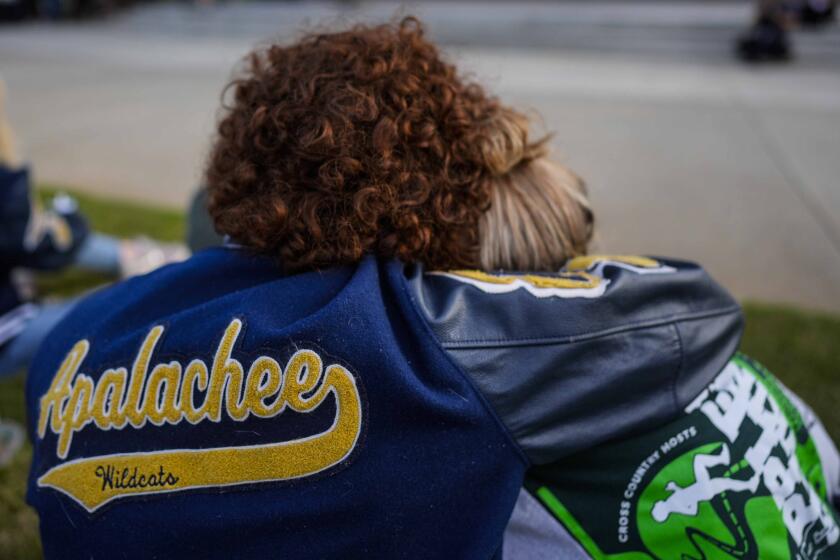THE NATION : HASAN IS CHARGED WITH 13 MURDERS : The Army psychiatrist may face the death penalty if convicted in military court of the Ft. Hood massacre.
Military officials on Thursday filed 13 charges of premeditated murder against Maj. Nidal Malik Hasan for allegedly gunning down his fellow soldiers last week, setting the stage for the most high-profile court-martial in a generation.
The charges carry the potential of the death penalty, which the military is widely expected to seek but has not formally announced it is pursuing. Because the 39-year-old psychiatrist is still an active-duty soldier, military courts have jurisdiction in the case.
“It’s quite possibly one of the most sensitive military justice matters that’s ever come up,” said Eugene R. Fidell, who teaches military law at Yale University and is president of the National Institute of Military Justice. “All this makes for a probably history-making case.”
Officials allege that Hasan, a devout Muslim who was due to deploy to Afghanistan, opened fire on unarmed soldiers who were filling out paperwork at the Soldier Readiness Processing Center here. Hasan is accused of fatally shooting 12 soldiers and one civilian before being shot by two civilian police officers.
On Thursday, Hasan remained confined at a military hospital, where authorities read the charges to him. Christopher Grey, a spokesman for the military’s investigative branch, said that the government remained convinced that Hasan had acted alone.
In Washington, President Obama ordered a review to determine whether the government had missed signs that Hasan could turn violent.
Anti-terrorism investigators had monitored Hasan’s e-mail exchanges with a virulently anti-American cleric in Yemen, and some of his fellow doctors at Walter Reed Army Medical Center in Washington, D.C., had questioned his apparent sympathies for jihadists. But he was permitted to stay in the military and was sent to Ft. Hood this summer for eventual deployment.
John Brennan, assistant to the president for counter-terrorism and homeland security, will oversee the review. Congress is also investigating how the case was handled, and the Senate is scheduled to hold hearings next week.
Grey said that investigators were still poring through evidence, and noted that the crime scene spreads over several buildings and open areas and that some witnesses were still hospitalized.
“Let me reassure the American public: We are looking into every possible reason for this shooting and we are aggressively following every possible lead,” Grey said.
Grey, who spoke during a brief news conference here and took no questions, said additional charges could later be filed against Hasan.
The Wall Street Journal reported Thursday night that the military had already decided to seek the death penalty, citing an anonymous source. But military officials would not confirm that and said the decision would be made by the commanding general of the base, Lt. Gen. Robert Cone, who received the formal charges Thursday morning.
There have been no military executions since 1961, though five people are on the military’s death row at Ft. Leavenworth in Kansas. Military law requires the president to formally approve any execution.
Analysts say that the dearth of executions is one indication that military courts can give defendants more protection than civilian courts.
A court-martial is called by a commanding officer -- often a general -- and presided over by a military judge. Its rules of evidence and discovery are similar to those in federal courts.
The jury will consist of at least 12 soldiers whose ranks must be greater than Hasan’s, meaning jurors will probably be lieutenant colonels or above.
Analysts said that Hasan’s case would be difficult to defend.
“This isn’t something that was done in the dark of night and we’re trying to reconstruct that behavior,” said David Brahms, a military defense attorney and former brigadier general. “There are dozens of witnesses.”
Under military law, premeditated murder does not require lengthy planning, only “the formation of a specific intent to kill and consideration of the act intended to bring death.”
The defense’s best bet is to argue that Hasan had mental problems that prevented him from making that consideration, said Geoffrey Corn, a former military prosecutor who teaches at the South Texas College of Law in Houston. “That’s the only hope I think he’s got,” Corn said.
Hasan will be given a military lawyer, and he has also retained a private one, a former colonel who has said there has been such overwhelming publicity here against his client that the court-martial should be held elsewhere.
Analysts expect the military to agree to move the trial but said that anywhere it goes it will be an extraordinary event. Fidell said that not since Lt. William Calley was convicted in 1971 for the My Lai massacre during the Vietnam War has a court-martial drawn the sort of attention that this one is expected to.
Analysts, however, said they were confident that a military jury could screen out the publicity and the pain that Hasan allegedly caused to their ranks.
“If anybody’s able to listen to the evidence, weigh it and follow the instructions of a judge, I’m confident a military panel will be able to do that,” Brahms said. “When they walk into the courtroom they take an oath to try to do it right.”
--
Julian E. Barnes in the Washington bureau contributed to this report.
More to Read
Sign up for Essential California
The most important California stories and recommendations in your inbox every morning.
You may occasionally receive promotional content from the Los Angeles Times.










